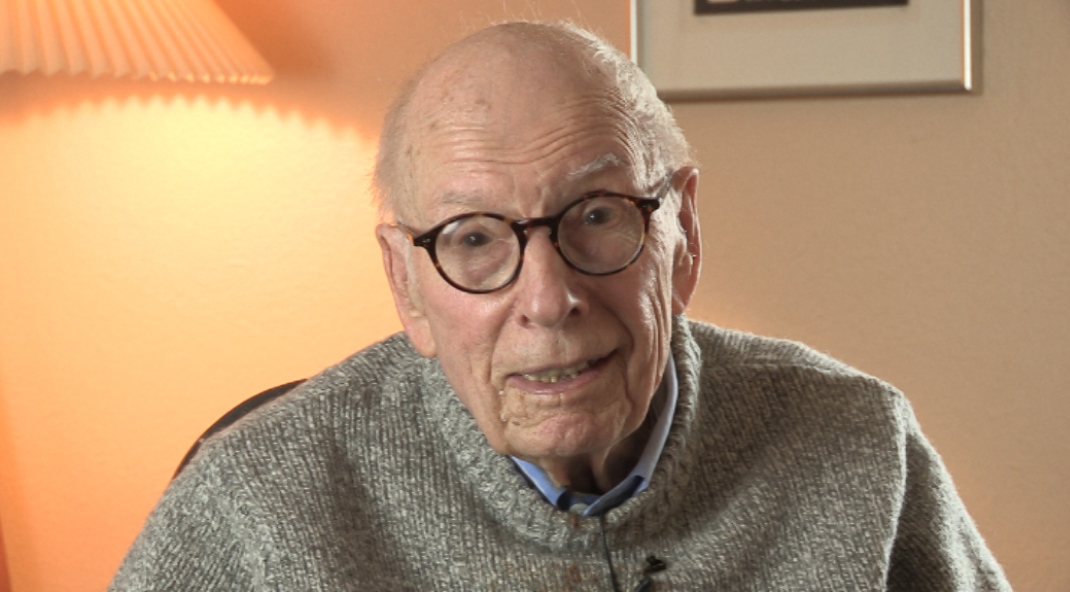NEXT STORY

My inferiority complex
RELATED STORIES

NEXT STORY

My inferiority complex
RELATED STORIES


|
Views | Duration | |
|---|---|---|---|
| 11. The charming Mr and Mrs Thomas H Morgan | 56 | 02:48 | |
| 12. Too generous to be my daddy! | 52 | 00:36 | |
| 13. Joining the inhabitants of ‘Mount Olympus’ | 53 | 02:33 | |
| 14. How far down does a blush go? | 60 | 01:57 | |
| 15. Meeting Father Time | 58 | 01:59 | |
| 16. My musical Swiss grandfather | 54 | 01:39 | |
| 17. Edwin Conklin versus Hans Driesch | 65 | 03:16 | |
| 18. My interests in evolutionary and developmental biology | 61 | 01:27 | |
| 19. The biddies of Harvard | 64 | 01:30 | |
| 20. Cracking calculus | 66 | 03:00 |


There are some courses that I took that weren't biology, which were ones I think I remember better, and loved more than anything. I took a course in French literature, it went by Professor Allard. And it was fantastic and I loved to read, and in those days I was sufficiently fluent in French so that I could read in French as fast as I could in English. So it was all pleasure.
But the thing that really educated me in science, was taking physical chemistry. I took a wonderful course - I'm a very poor mathematician, major understatement - and in physical chemistry, you spend a great deal of time with differential equations, partial ones, and everything. And I really learnt the basic calculus there, rather than in the awful calculus course that I took, when you had people going in row, rowboats and the current was going this way, and this that and the other thing. And well, you find yourself saying, screw the rowboat, I'm not interested. But the professor who gave the physical chemistry was just brilliant, and I had the greatest satisfaction. We had an hour exam and he put the question on the board and we all sat down. And there were always about four or five people who were immediately writing. And the rest of us just - there were 60 students - and the rest of us just looked at it and laughed because we didn't know how to do it, and I just stared for 40 minutes, 45 minutes. And then, suddenly I realised, I saw what the trick was with this question of how all these things were brought together in one basket and so I said, five minutes left, I just see how it's done. And then, I wrote down not the equations, but the description of what you should do to solve the problem. I got 95 out of 100. I don't think I've ever been so happy with a grade in all my life.
John Tyler Bonner (born in 1920) is an emeritus professor in the Department of Ecology and Evolutionary Biology at Princeton University. He is a pioneer in the use of cellular slime molds to understand evolution and development and is one of the world's leading experts on cellular slime molds. He says that his prime interests are in evolution and development and that he uses the cellular slime molds as a tool to seek an understanding of those twin disciplines. He has written several books on developmental biology and evolution, many scientific papers, and has produced a number of works in biology. He has led the way in making Dictyostelium discoideum a model organism central to examining some of the major questions in experimental biology.
Title: Cracking calculus
Listeners: Christopher Sykes
Christopher Sykes is an independent documentary producer who has made a number of films about science and scientists for BBC TV, Channel Four, and PBS.
Tags: physical chemistry, equations, calculus, exam
Duration: 3 minutes
Date story recorded: February 2016
Date story went live: 14 September 2016